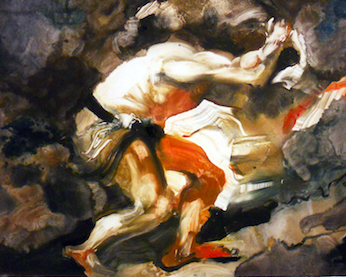saint sarah: love alone
I knew that Togo would be hard, but I didn't know it would be that hard. I didn't know that even in rainy season, it only rained once or twice a week, and it was still very hot and very dry. I didn't know that my shifts would be 28 hours long, or that I would get malaria (in spite of taking anti-malaria pills faithfully every night), or that the town would run out of water for three days or that the Internet would go out and I would be unable to contact family and friends for days at a time. I didn't know that I'd lose more patients in one week in Togo than I'd lost in a decade of practicing medicine in the U.S.
I kept going. Because I was part of a team that was working hard, and I wanted to do my part. Because dozens of people had helped fund my trip to Togo, and I didn't want to let them down. Because I had committed to being in Togo for three months and I wanted to keep my word. Because I cared about the Togolese people and wanted to do as much as I possibly could to alleviate their suffering.
And then I took care of a 2-year-old girl with cerebral malaria whose father was one of the most devoted parents I'd ever seen. She had seizure after seizure. Every time she seized, she stopped breathing, but we didn't have a ventilator to put her on. So I stood there breathing for her with an Ambu bag for hours and hours that night.
She died around 6 a.m. the following morning. I'd done everything I could do and gotten no sleep for almost 30 hours, and yet I still couldn't hold onto her.

When I knew she was gone, I turned to her father and just shook my head.
He ran out of the hospital. I went after him, and found him outside, kneeling in the dirt, bowing with his face toward the rising sun, tears streaming down his face.
I quietly went back inside. I took out the girl's I.V. and peeled the EKG patches off of her chest. I wrapped her in cloth and when the father came back inside, I handed him the body of his baby girl. The child I'd worked on all night. The child I couldn't save.
I was fearful of his response. I wouldn't blame him for being angry, and for taking all his pain and grief and anger out on me.
But instead, he bowed his head to me and said in French, "Thank you. There is love in your eyes." And then, slowly, he walked home to bury his baby girl.
As I watched him leave, I was grateful for his kind words, that I had looked at his little girl with love. In the end, when all else failed, the only thing I had to give his daughter was love. And yet, I thought, love isn't ENOUGH.
When my shift ended I went back to my room. I was going to take a walk through the corn fields and vent at God, but there was a big rainstorm so I had to stay inside. I laid down to take a nap, but I couldn't sleep, so I ended up listening to a podcast I'd downloaded about the story of Sisyphus.
In the Greek myth, Sisyphus is condemned by the gods to an eternal punishment. For the rest of eternity, he will carry a large rock up a hill, and just before he reaches the top, the rock will roll back down and he'll have to start over again.
The story gives rise to the adjective Sisyphean, something that's futile, frustrating and hopeless.

I loved that adjective. I told God that this hospital was Sisyphean. No matter how hard we worked, no matter how hard we tried, patients kept dying and new patients kept coming and it never let up.
The story seemed like such a good metaphor for what I experiencing, I became fascinated by it. I read essays by Kafka and Camus, who were also gripped by the story. They each concluded that Sisyphus was the victor, not the victim, of the story. They said he was the hero of the story. They said we should think of him as happy.
What the heck?
I kept reading, trying to understand their take on the story, until I stumbled across a poem by Stephen Mitchell, who said that Sisyphus is happy because,
The truth is that Sisyphus is in love with the rock.
He cherishes every roughness and every ounce of it.
He talks to it, sings to it.
It has become the Mysterious Other.
He evens dreams of it as he sleepwalks upward.
Life is unimaginable without it, looming always above him like a huge gray moon.
Sisyphus is the happy victor and hero of the story because he has fallen in love with the rock.
I thought of Jesus, the ultimate Sisyphus, who loved the world so much, he put it on his back and carried it up the hill, all the way to Calvary and then, in the ultimate demonstration of love, laid down and died for it.
Love didn't seem like enough to me. Love didn't seem like enough to conquer the Darkness I'd been living in for two years. Love didn't seem like enough for a grieving father. Love didn't seem like enough for a world with unbelievable poverty, suffering and pain.
But, when I understood the story of Sisyphus, I came to see that Love -- and Love alone -- is all we need.

Letting Love all the way in is what finally dispelled the Darkness I'd lived in for two years. I finally understood the invitation Jesus gives in Revelation 3, "Behold, I stand at the door and knock...."
Love makes us persevere in difficult situations -- in humanitarian work, in rocky marriages, in relationships with wayward family members, in our faith journeys -- when we have run out of motivation and and energy and incentive and positive emotions and desire.
Love leads us to make sacrifices -- to lay down our pride and our "rights" and our resources and even our lives.
Love comforts us in death and, on the other side of eternity, resurrects everything and everyone we have lost into new Life.
In the end, we find that Love is all we have.
And in the end, we find that Love-- and Love alone -- is all we've ever needed.
